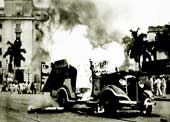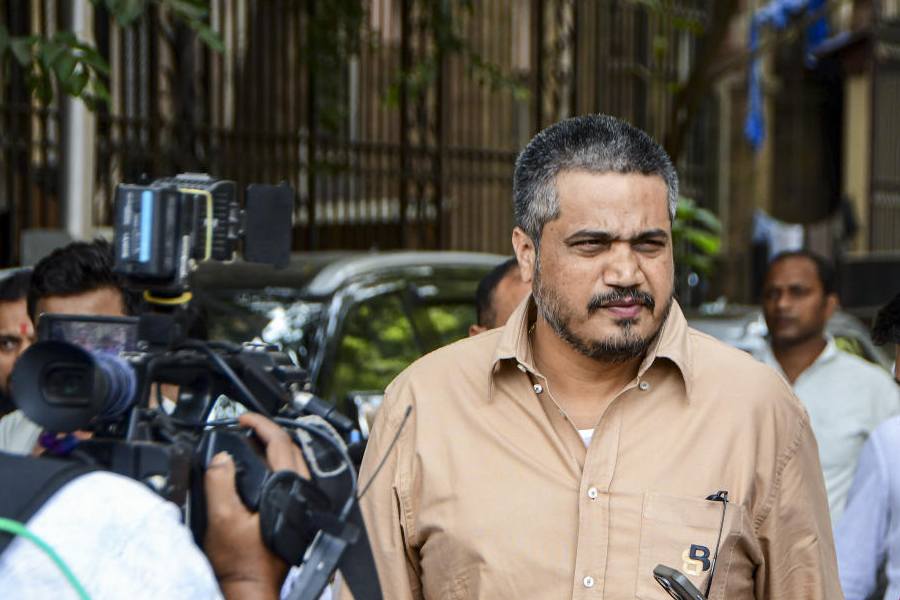|
|
| Instructed by the past |
It is appropriate, indeed commendable, that the external affairs minister, Yashwant Sinha, has been seeking wide-ranging advice on the looming crisis over America’s temptation to go to war with Iraq. Several friends, associates, even acquaintances, all of whom consider themselves competent to offer advice on Iraq, have already discussed Saddam Hussein’s future and India’s stake in it with Sinha on different occasions since Baghdad became the critical focus of international diplomacy. It is this columnist’s hope that Sinha will not be guided by the bulk of the advice he has received so far: that he would be guided, instead, by common sense and discretion.
The most compelling argument against acting on much of the advice that he has received so far is that good advice on Iraq is hard to come by in India. Sinha only has to recall the last war led by the United States of America against Iraq, when he was part of the treasury benches, and the government led by the party he then belonged to followed precisely the same policy which many of those outside the government are now advising him to go for. There were only two other countries which shared Inder Kumar Gujral’s perception in 1990 that cosying up to Saddam Hussein was the right thing to do — Jordan and Yemen. The rest of the world was willing to do something, howsoever small, to deprive Saddam of the fruits of naked aggression against a small neighbour, Kuwait.
Intellectuals in most of India, much of the national media and the vast majority of the country’s strategic community were behind Gujral’s pro-Iraq diplomacy. Indian Muslims too supported the dictator in Baghdad. The key men in South Block, who unfortunately shaped India’s foreign and Gulf policies at that time, were committed to the idea of backing Saddam although the bulk of the Indian foreign service, it must be said, saw through the folly of it.
Sinha was finance minister in the government which subsequently had to pick up the pieces of Gujral’s Iraq policy after the collapse of Saddam’s much-touted army and air force. He should have no difficulty in recalling that India got away lightly for the biggest folly in its diplomatic history only because the world altered beyond recognition in the year of the last crisis over Saddam. The Soviet Union disintegrated, throwing up challenges to which there are still no answers. India also became a member of the United Nations security council at that time, making it imperative for the international community to court New Delhi instead of spurning it.
A response to an American attack on Baghdad in the period ahead is, therefore, a huge challenge for Sinha. It is very tempting to stand up and be counted among those who are opposing George W. Bush’s brazen unilateralism. This temptation is buttressed by the argument put forward by many of those whom Sinha has consulted: that Saddam is secular, he did not order women to wear the veil, he allowed nightclubs in Baghdad, and anyone could get a drink in Iraq. Some of those who have talked to Sinha have portrayed the Iraqi dictator as the bulwark against the talibanization of a crucial part of west Asia.
But the truth is, that was a long time ago. In the last decade, Saddam has taken a leaf out of Zia ul-Haq’s book. Saddam has done precisely what Zia did to consolidate his hold on Pakistan, and pandered to radical Islam as a way of retaining — or regaining — popular support in the aftermath of his defeat in the war against the international community over Kuwait. Go to the Shia strongholds in Iraq, where Saddam once used methods similar to that of the late Shah of Iran against Shiite radicalism, and see how he has ruthlessly used Islam as a convenient political tool to buy the support of the very people whom he once suppressed or killed in massive numbers.
The Islamization of Iraq in the last decade is an uncomfortable fact of life which India has closed its eyes to. Besides, many of those who have been lately giving advice to Sinha on Iraq are those who chose to look the other way when successive governments in New Delhi and in several states equated appeasement of minorities with the principles of secularism. The more compelling argument put to Sinha is that Iraq has supported India on Kashmir and, therefore, New Delhi has a debt to repay Saddam. This is nothing but Nehruvian altruism. It is understandable that many Indians are carried away by emotions instead of rational analysis when Kashmir is in question. But a close examination of Saddam’s stand on Kashmir will show that his support for India on this issue is as hollow as the Iraqi dictator’s counterfeit secularism which has been exposed in the last decade.
Kashmir and the Organization of Islamic Conference are now so intertwined in the Indian mind that many people, even those in high authority, are apt to be misled for lack of an in-depth look at such a connection. The OIC has been such a bugbear for South Block since Fakhruddin Ali Ahmed, a minister in Indira Gandhi’s cabinet, was turned away from its 1969 summit, that it may come as a surprise to many Indians that the 57-member Islamic group did not get involved in the Kashmir issue until 1990. It was at the Cairo meeting of Islamic foreign ministers in 1990 that the OIC passed a resolution on Kashmir for the very first time. That meeting took place just three days before Saddam invaded Kuwait. And it was at that meeting that Iraq was most vocal in its support for India on Kashmir.
Tariq Aziz, the great survivor in Saddam’s inner circle who was then foreign minister, forcefully opposed the OIC resolution on Kashmir. India has been grateful to Aziz for his support in Cairo. But diplomacy is about national interest, never about sentiment. It is necessary for Sinha now to look back and view Aziz’s support at that OIC meeting 12 years ago in perspective. Since the Cairo meeting opened a mere three days before Kuwait was brutally overrun by the Iraqi army, it is inconceivable that Aziz would not have been privy to Saddam’s plans and preparations to invade his small neighbour. In any case, the skirmishes with Kuwait over the Shatt-al-Arab waterway had started even before Aziz left for Cairo.
Saddam is wily enough to have calculated that he could not get outright endorsement for his aggression from any Islamic country. He shrewdly surmised that the Palestinians would support him and portrayed his action against Kuwait in an anti-Israel light. And the Palestinians did support him. In Kuwait, they acted as a fifth column for the Iraqis during the occupation and paid a huge price for their perfidy when 350,000 Palestinians had to leave the emirates after its liberation. Saddam calculated that he could win India’s support in the post-invasion phase if he played his cards right. It was assumed by August 1990, when Kuwait was overrun, that India’s election to the UN security council was on the anvil: a crucial factor in leveraging Baghdad’s ability to keep Kuwait for ever as Saddam intended to.
Playing his cards right in the south Asian context meant supporting India on Kashmir. This was what Saddam asked Aziz to do. There was yet another incentive. Saddam’s bills were piling up: already he owed Indian companies close to two billion dollars for work done in Iraq, interest included. He did not have money. His costly war with Iran had brought a once prosperous country to penury. Maybe support on Kashmir would persuade New Delhi to waive some of the debt?
After all, only a few years earlier, when the Indian government found that there was little hope of recovering Iraqi dues, a decision was taken to give more money to Saddam. The curious rationale, in which South Block played a big part, was that if New Delhi could help Saddam straighten out some of his finances, he could be persuaded to repay some of the two billion that was owed to Indian firms. As it turned out, Saddam proved to be smarter than the Indians. His dues to India are now probably at least a billion dollars more than the original two billion because his Indian creditors have been incurring interest. It is unlikely that India will ever see any of that money.
Those who advise Sinha to take a stand on Iraq which has even shades of New Delhi’s policy in 1990 fail to see that Saddam took India for a ride then and advanced his priorities at a cost to New Delhi which could have been higher had it not been for fortuitous circumstances. Hopefully, history will not repeat itself.










